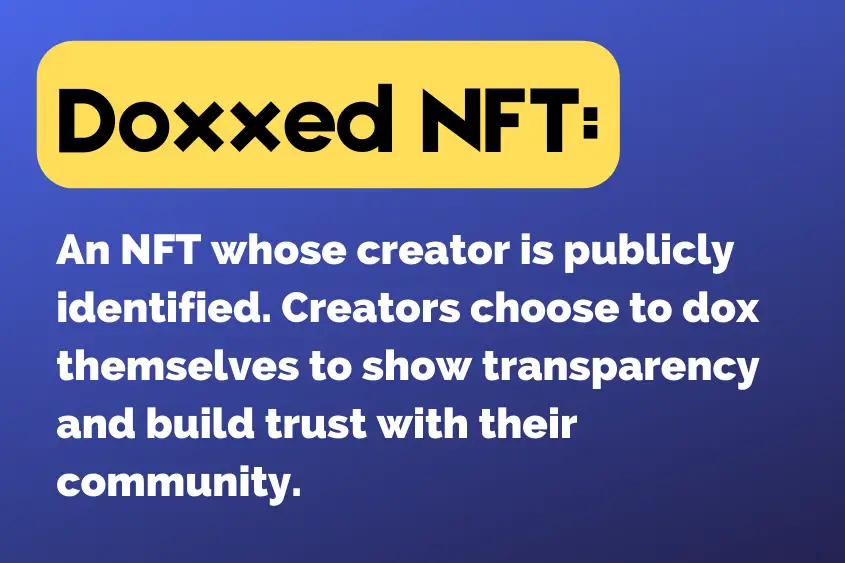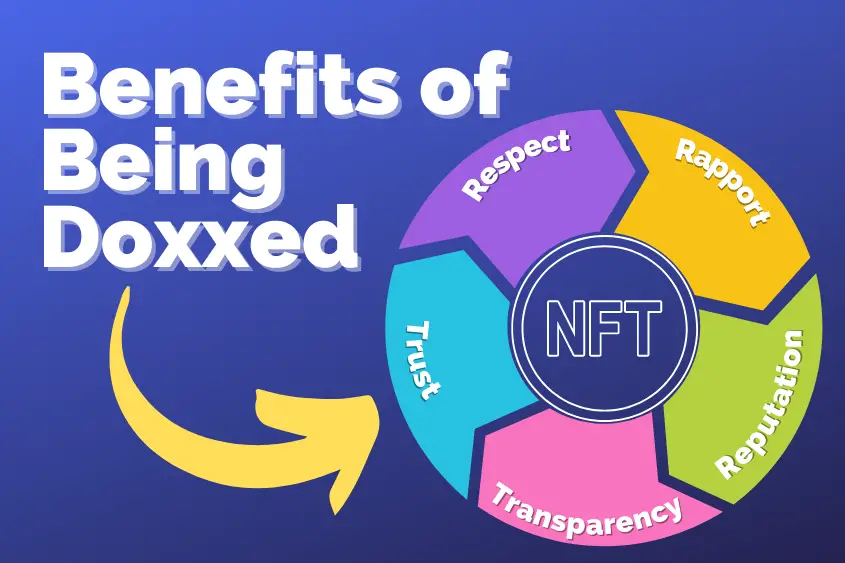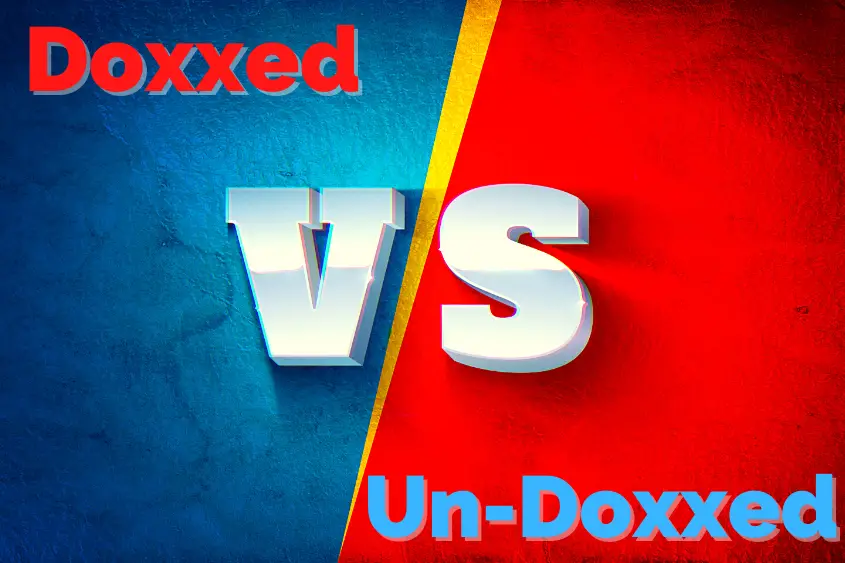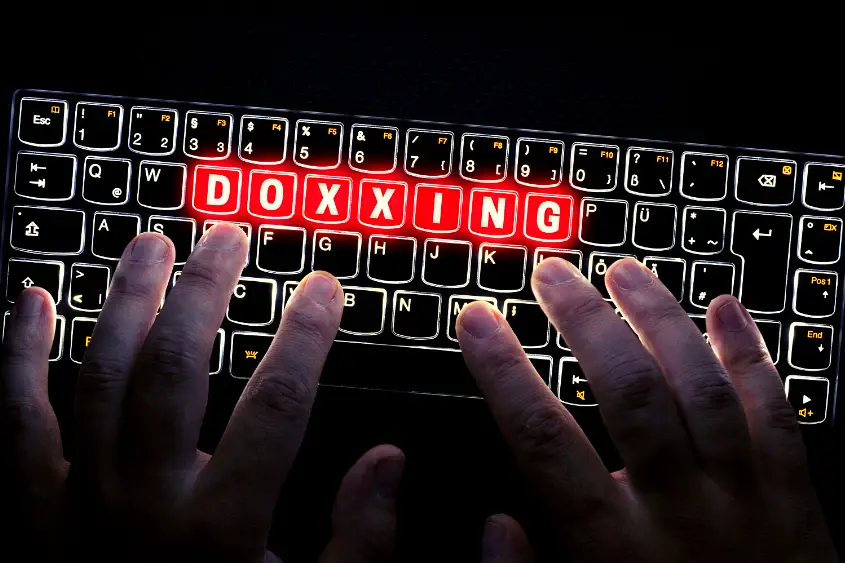While navigating the web3 space you’ve probably noticed that there are many terms you’re unfamiliar with. One of these terms is “being doxxed”, which actually carries a negative connotation. However, when referring to NFTs, being doxxed is a good thing. So what is a doxxed NFT?
A doxxed NFT is one whose creator is publicly identified. Creators choose to dox themselves to show transparency and build trust with their community. Those who choose to dox themselves are willing to put their entire reputation on the line. In the web3 space, being doxxed is considered a good trait.
That being said, let’s dive in and get a better understanding of doxxed NFTs, how the definition of this term has shifted since its earliest usage in the 1990s, and what this reveals about the current state of NFT culture.
What Does it Mean to Be Doxxed?
Dox is an abbreviation of the word “documents”, and in the 1990’s hacker culture, “dropping dox” had the meaning that the personal or private information of an individual was made available to the public without the individual’s consent.

The term “doxxing” is still used in this way in certain subcultures and in the mainstream press. However, in the web3 space, “being doxxed” simply means you are not anonymous.
And unlike the original definition, the term doesn’t necessarily have the same connotation of malintent.
For example, if an NFT project says they are “fully doxxed”, it generally means that the project team members are using their real names and are not hiding behind a shadow of anonymity.
Is Being Doxxed a Good Thing?
A doxxed NFT is considered a good thing. Doxxed teams are transparent about who they are, their past success and failures, as well as their future goals. Choosing to be a doxxed team is beneficial for both creators and consumers of an NFT brand and is one of the initial factors for determining value.

Below are some examples of how being doxxed is beneficial for both creators and consumers.
Benefits for Creators
As a creator, being doxxed means that you have nothing to hide. Hence, there are many benefits.
- Trust: The main benefit of choosing to be doxxed comes in the form of trust. Building trust with your community and your potential consumers is huge—especially in a space like web3 that is still in its infancy.
- Reputation: Doxxed creators can more easily leverage their present success for future endeavors by building a strong reputation for themselves and their brand.
A solid reputation is valuable to every creator. Mainly because it takes a lot of time, effort, and patience to build a good reputation. Being doxxed sets you up to start building a reputation—whether it’s a bad or good one is up to you.
- Rapport: Building a rapport is critical to fostering long-lasting and genuine communities. And It’s not so easy to connect with someone you don’t actually know.
More often than not, consumers are creating relationships online with their favorite brands and other people who share similar interests as them.
Being doxxed allows your community to understand you as the human behind the brand. As a result, communication becomes easier and so does the ability to foster new relationships.
- Respect: Respect is like a multi-lane highway. There’s internal respect for yourself determined by your own actions, in addition to the respect gained from those in your inner circle. Then there’s external respect gained from those on the outside looking in.
Either way, respect is a huge perk of being doxxed. You don’t have to hide who you are because your intent is good.
Benefits for Consumers
Being doxxed isn’t only beneficial for the creator, it’s also very much appreciated from a consumer’s standpoint.
- Trust: What just so happens to be the most important factor for NFT creators is also the greatest benefit for consumers. You guessed it. Trust. The more transparent the team behind an NFT brand is, the easier it is to trust them as a consumer.
Moreover, consumers can easily research creators behind a brand when they are doxxed. This means consumers are more willing to buy whatever a brand might be offering.
- Transparency: It wouldn’t be web3 if there wasn’t some level of transparency involved. The more open a brand is regarding its intentions, the better off consumers are.
Not only does transparency enable consumers to make better buying decisions, but it also allows them to determine if what they’re buying is exactly what they’re looking for. - Ease of mind: At the end of the day, most consumers are after the ease of mind. They want to feel good about what they’re buying and confident in their decision.
Doxxed NFTs can help provide this ease of mind. Knowing exactly what you’re buying, who you’re buying it from, and that what you’re promised is sure to be true is one of the most comforting feelings as a buyer.
Why Are Some NFTs Doxxed and Others Aren’t?
NFT Creators with the intention of building a long-lasting and sustainable brand are generally doxxed. Those who wish to remain un-doxxed might have malicious intentions or a lack of confidence in their ability to execute. Also, some might choose to remain un-doxxed for security reasons.

Being anonymous (or maybe more accurately, pseudonymous) in the NFT world is more the norm rather than the exception.
People often use PFPs (profile picture NFTs) as their avatar on Twitter and go by handles that are suited for the NFT space (such as using “NFT” or “.eth” as part of a longer username).
There are a couple of reasons for this kind of anonymity.
Security
The NFT space is still in its Wild West days and people are worried about their security.
Hackers armed with information about you may have a better chance of stealing your crypto, breaking into your online accounts, and generally making a mess of your life.
Although being anonymous may somewhat help improve your security, you should always be vigilant.
Culture
Anonymity is almost baked into the blockchain culture starting from the early Bitcoin days, but there is more to it than that in the NFT world.
In the metaverse, you are free to be who you want to be and you can explore this world without being tied down by your in-real-life (IRL) persona.
For example, by using a Twitter account with an NFT-related username and PFP, people can connect and communicate with other NFT community members in a way that people outside the NFT world couldn’t understand or even follow.
Therefore, it is generally accepted that people don’t use their real names.
Doxxing as a choice
Given the strong culture of anonymity in the NFT space, doxxing yourself is considered a choice. In this community, if someone is doxxed without consent, it can be seen as a violation of an unwritten right.
For example, in February of 2022, BuzzFeed doxxed the founders of the Bored Ape Yacht Club.
This type of doxxing without consent was highly controversial in the NFT community.
On the one hand, Bored Ape Yacht Club (BAYC) was a major NFT project raking in millions in sales. Having founders of a project of this size that were un-doxxed seemed akin to having a major corporation being run by an anonymous CEO. It just seemed too opaque.
On the other hand, being doxxed without permission was considered a form of harassment and a violation of privacy, particularly because being anonymous is acceptable in this world.
Should You Only Buy NFTs from Doxxed Teams?
Buying an NFT from a doxxed team allows you to hold someone accountable if something goes wrong. Therefore, buying from a doxxed team may be a safer option for those who are weary. And although buying un-doxxed NFTs is riskier, successful brands like Bored Ape Yacht Club initially launched un-doxxed.

Of course, there’s a lot to consider when deciding whether or not you should only trust in doxxed NFTs. Below are some of these considerations.
The Acceptance of Un-doxxed NFT Projects
Since so much of the NFT world is anonymous, many NFT project founders operate under pseudonymous handles without necessarily any intent to do something shady.
And most buyers accept this type of anonymity.
In other words, buying an NFT from an un-doxxed team isn’t an immediate “no” for many people in the NFT space.
And there have been many successful NFT projects that were started by anonymous teams, from BAYAC to Goblintown.
The Value of Doxxed NFT Projects
Since so many people have been burned by scams and rug pulls in this space, a project team that is willing to fully dox themselves can give a signal that they are trustworthy and are willing to take personal responsibility for their actions.
In addition, a fully-doxxed team can mean that their IRL (in real life) track record can play a part in the value of the NFT.
For example, Moonbirds is an NFT brand that took off even while the NFT market was entering a bear market in April of 2022.
Moonbirds is part of the Proof Collective, a project started by Kevin Rose, a long-time Silicon Valley entrepreneur.
It is clear that his name and past track record had a lot to do with the success of the project since buyers likely wanted to be part of Kevin Rose’s circle and were interested in networking with other web3 entrepreneurs.
The Future of Fully Doxxed NFT Projects
The trend for having fully doxxed project teams will likely increase as the NFT market grows and buyers demand more trust in these projects.
In other words, anonymity may be fine for buyers of NFTs, but not as much for their creators, particularly if the project has an ambitious roadmap, a lot of technical risks, or where the value of the project is tied, at least in part, to the past (or even future) track record of the founders.
In any case, whether you buy an NFT from a doxxed or un-doxxed project team, understand that there will always be risks in this space. Not just from scams, but from project failures ranging from poor execution to lack of product-market fit.
Final Thoughts
As the NFT industry matures, we will likely see more project teams being fully doxxed. The marketplace will likely want to see a higher level of trust, particularly as this industry goes mainstream.
But as a participant in the NFT scene, you can choose to be un-doxxed as it is a right that is generally respected. In the metaverse, you can choose your own path.

2 thoughts on “What Is a Doxxed NFT?”
Comments are closed.